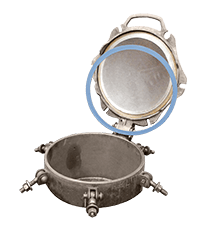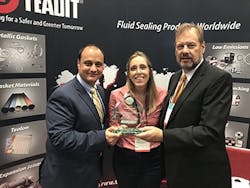Since 1964, Chemical Processing biennially has bestowed Vaaler Awards on products that promise to significantly improve the operations and economics of plants. This year’s awards were open to entries that were commercialized in the United States between May 2017 and June 2019.
The awards are named after John C. Vaaler (1899–1963), chairman of Chemical Processing’s Editorial Board from 1961 until his death. He became editor-in-chief of Chemical Processing in 1946, after 24 years in the chemical and related industries.
An impartial panel judged the entries. It consisted of the members of Chemical Processing’s Editorial Board — a group of technical professionals with diverse responsibilities and from a variety of industry sectors (see sidebar). The panel assessed all entries on three criteria: technical significance; novelty or uniqueness; and breadth of applicability. It wasn’t obliged to give any awards — but did decide to honor two products:
• Field Xpert SMT70 from Endress+Hauser, Greenwood, Ind.; and
• Origin RC510 Gasket from Teadit North America, Pasadena, Texas.
Rugged Tablet Eases Field Instrument Management
Field instruments play a critical role in the safe and efficient operation of plants. Managing these instruments over their entire lifecycle and documenting work done usually consumes significant staff time. The Field Xpert SMT70 (Figure 1), a tablet personal computer from Endress+Hauser, gives today’s mobile workforce a powerful and rugged tool to ease commissioning as well as ongoing maintenance of field instruments in hazardous and non-hazardous locations — saving time and cost per device while helping ensure safe and reliable production. The tablet is ready to go right out of the box and works with virtually every modern field instrument, regardless of vendor. Its simple touch-enabled device configuration software navigates a technician through commissioning, troubleshooting and configuration work.
Figure 1. Rugged device connects via a single click to virtually any modern instrument and enables online updates to add functionality and maximize security.
Field Xpert SMT70 comes preinstalled with device configuration software and device libraries. The easy-to-use tool communicates with all modern field instruments that use DTM (device type manager) or EDD (electronic device description) technology. Automatic hardware detection enables fast one-click connection to devices. The tablet also can provide online software and DTM/driver updates to afford new functionality and maximum security.
The unit is approved for Class 1, Division 2, Groups A, B, C, D, T4 and Class 1, Zone 2, Groups IIC, T4.
Launched in the United States in January 2018, the slim 1.2-kg tablet boasts an 11.6-in. high-definition sunlight-readable display, a 2-megapixel front-facing camera, a micro-SD card slot, Windows 10 Pro, automatic saving of a HART device report in Endress+Hauser’s Netilion Library, and up to 7 hours runtime. It contains an Intel i5 processor, 8-GB RAM and a 256-GB solid-state drive. Options include a 5-megapixel autofocus camera with LED flashlight, upgraded run time of up to 14 hours, and a docking station that provides 1-GB Ethernet, 4 USB ports and an HDMI connection.
Field Xpert SMT70 features touch-enabled device configuration software in 20 languages. Communication ports and supported networks include USB, Ethernet, HDMI, Wi-Fi and Bluetooth, with 4G LTE and GPS as options. The tablet also supports Endress+Hauser’s Heartbeat Technology and FieldCare instrument diagnostic, verification and monitoring functions, adhering to NAMUR NE 107.
Figure 2. Made by an innovative process, the wound PTFE gasket provides better sealing while avoiding the high scrap rates incurred when using sheet material.
Unique Manufacturing Process Produces Better Gasket
Effective sealing of manways and bolted joints often is essential to ensure safety and prevent product loss. For instance, petrochemicals transported via rail require tight sealing of the railcars’ manway dome lids. The Origin RC510 gasket (Figure 2) offers major improvements in leak reduction and bolt-load retention over elastomeric sheet gaskets, reducing costs and material wastage as well providing unmatched durability. The product consists of restructured hollow-glass-microsphere-filled PTFE and is manufactured by unique technology.
The gasket is easy to install and uninstall, making multiple use a possibility, and provides extended life over multiple cycles. While designed particularly for railcars, it also suits use on bolted joints with low load potential, such as in plastic piping and fiber-reinforced-plastic assemblies. However, the gasket is robust enough for standard piping applications. Three variants now are available — for railcar manway dome lids, acid piping and general services.
Leakage tests — repeated cycles subjecting gaskets to 35-psi pressure and 250-ft-lbs torque at room temperature, with each 24-hr cycle involving opening and closing a lid each hour for eight hours and then pressurizing for the next 16 hours — showed no noticeable decrease in performance for Origin RC510 after 40 cycles; competitive gaskets totally failed after only 10–30 cycles. Moreover, the wound gasket doesn’t suffer from aging or weathering, and doesn’t have shelf-life limitations, so it can be stored indefinitely.
Amanda Joshi, managing editor of Chemical Processing, presents the Vaaler Award to Teadit North America’s Chris Day (right), CEO, and Daniel Angulo, P.E., applications engineer for their Origin RC510 gasket.
Innovative “Origin” technology produces the gasket, which was introduced in the United States in June 2018. That technology yields a wound sintered PTFE gasket. It enables tailoring the gasket to specific needs. Customization, for instance, can include radial density variations, different colors to denote gasket region and properties, or even distinctive fillers along its radius.
The process starts with PTFE resin powder, which can be mixed with one or more fillers. It then is extruded, laminated and cut into tapes of pre-set width, which determines the gasket thickness. Next, the tape is wound to the gasket inner-diameter/outer-diameter size and sintered to produce the final product. Unlike sheet materials, whose available sizes limit gaskets to no larger than 2.0-m diameter, the Origin technology can produce gaskets in larger sizes, depending upon manufacturing capabilities.
THE JUDGES
Dan Brown, capital project manager, Pfizer, Kalamazoo, Mich.
Vic Edwards, process safety consultant, Houston
Fred Gregory, process safety and risk manager, Lubrizol, Deer Park, Texas
Rachelle Howard, senior process control engineer, Vertex Pharmaceuticals, Boston
Julie O’Brien, director of sustainability, Air Products and Chemicals, Allentown, Pa.
Roy Sanders, process safety consultant, Lake Charles, La.
Ellen Turner, market development representative, Eastman Chemical, Kingsport, Tenn.
Dave Vickery, manufacturing and engineering technology fellow, Dow Chemical, Midland, Mich.
Mark Rosenzweig is Chemical Processing's Editor in Chief. You can email him at [email protected].






